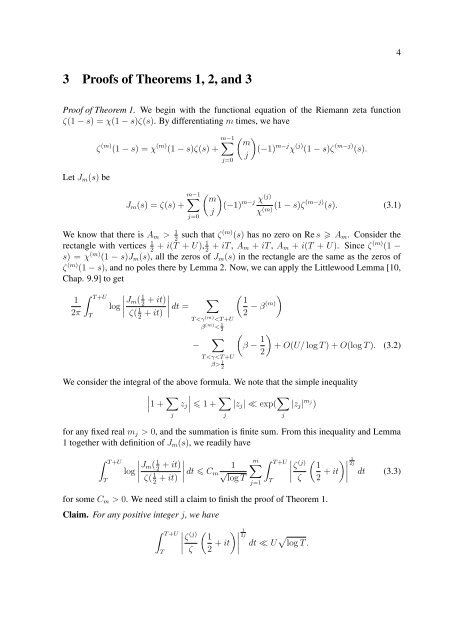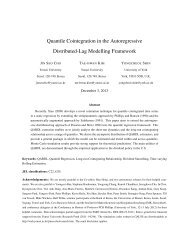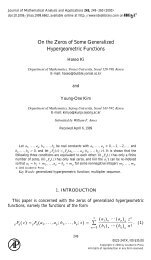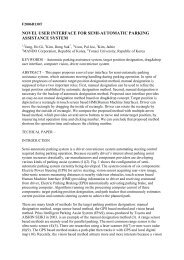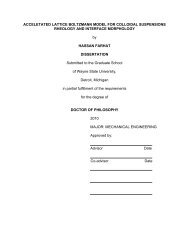Zeros of the Derivatives of the Riemann Zeta-function ∗
Zeros of the Derivatives of the Riemann Zeta-function ∗
Zeros of the Derivatives of the Riemann Zeta-function ∗
Create successful ePaper yourself
Turn your PDF publications into a flip-book with our unique Google optimized e-Paper software.
3 Pro<strong>of</strong>s <strong>of</strong> Theorems 1, 2, and 3<br />
Pro<strong>of</strong> <strong>of</strong> Theorem 1. We begin with <strong>the</strong> <strong>function</strong>al equation <strong>of</strong> <strong>the</strong> <strong>Riemann</strong> zeta <strong>function</strong><br />
ζ(1 − s) = χ(1 − s)ζ(s). By differentiating m times, we have<br />
Let Jm(s) be<br />
ζ (m) (1 − s) = χ (m) (1 − s)ζ(s) +<br />
Jm(s) = ζ(s) +<br />
m−1 �<br />
j=0<br />
m−1 �<br />
j=0<br />
� �<br />
m<br />
(−1)<br />
j<br />
m−j χ (j) (1 − s)ζ (m−j) (s).<br />
� �<br />
m m−j χ(j)<br />
(−1)<br />
j χ (m) (1 − s)ζ(m−j) (s). (3.1)<br />
We know that <strong>the</strong>re is Am > 1<br />
2 such that ζ(m) (s) has no zero on Re s � Am. Consider <strong>the</strong><br />
rectangle with vertices 1<br />
1<br />
+ i(T + U), 2 2 + iT , Am + iT , Am + i(T + U). Since ζ (m) (1 −<br />
s) = χ (m) (1 − s)Jm(s), all <strong>the</strong> zeros <strong>of</strong> Jm(s) in <strong>the</strong> rectangle are <strong>the</strong> same as <strong>the</strong> zeros <strong>of</strong><br />
ζ (m) (1 − s), and no poles <strong>the</strong>re by Lemma 2. Now, we can apply <strong>the</strong> Littlewood Lemma [10,<br />
Chap. 9.9] to get<br />
� T +U<br />
1<br />
2π T<br />
�<br />
�<br />
log �<br />
�<br />
Jm( 1<br />
2<br />
ζ( 1<br />
2<br />
�<br />
+ it) �<br />
�<br />
+ it) � dt =<br />
�<br />
T


